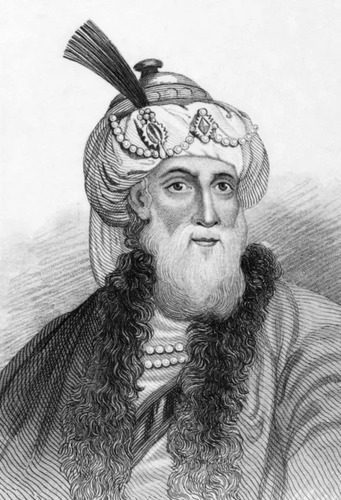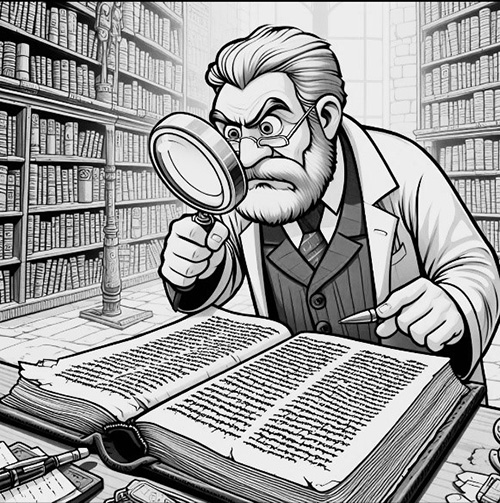How Josephus Validates Scripture: Without Intending To
In the quest to verify the historical accuracy of the Gospels, few sources are as valuable as the writings of a man who had no interest in promoting Christianity. Flavius Josephus, a first-century Jewish historian, provides some of the most compelling external evidence for the historical reliability of the Gospel accounts—all while never intending to do so.
WHO WAS JOSEPHUS?
Born Joseph ben Matthias in 37 AD to a priestly Jewish family in Jerusalem, Josephus lived through one of the most turbulent periods in Jewish history. After briefly joining the Jewish revolt against Rome, he surrendered to Roman forces and eventually gained favour with Emperor Vespasian. Under Roman patronage, he wrote extensive histories including The Jewish War and Antiquities of the Jews, providing invaluable insights into first-century Judea—the very world where Jesus and his disciples lived and taught.
JOSEPHUS ON CHRIST AND CHRISTIANS
Josephus was not a Christian convert, nor did he show particular admiration for the early Christian movement. His most famous reference to Jesus appears in what scholars call the ‘Testimonium Flavianum’ (Antiquities 18.3.3). While some scholars suggest parts of this passage are likely later Christian interpolations, most agree Josephus did make some reference to Jesus here. The unembellished core probably acknowledged Jesus as a teacher who was crucified under Pontius Pilate and whose followers continued their movement after his death.
He also mentions “James, the brother of Jesus who was called Christ” (Antiquities 20.9.1), a passage generally considered authentic and providing independent confirmation of Jesus having a brother named James, as mentioned in the Gospels.
HOW JOSEPHUS VALIDATES SCRIPTURE
Historical Context That Frames the Narrative: Josephus meticulously documents the political, social, and religious landscape of first-century Judea. His descriptions of Roman governance, Jewish religious factions, and cultural practices provide the exact backdrop against which the Gospel narratives unfold. This contextual information confirms the Gospels accurately represent the world they claim to describe.
Biblical Figures Independently Confirmed: In addition to Jesus and James, Josephus mentions other figures from the Gospel narratives:
- John the Baptist, describing him as a righteous man who performed baptisms and was executed by Herod Antipas (Antiquities 18.5.2)
- Pontius Pilate, detailing his tenure as governor of Judea and his often harsh governance
- The Herodian dynasty, including detailed accounts of Herod the Great and his sons
Each reference provides independent historical verification of people the Gospels present as real historical figures.
Parallel Events That Align With Gospel Accounts: Several historical events documented by Josephus align with Gospel narratives:
- The Census of Quirinius (mentioned in Luke 2:1-2), which Josephus places in 6 CE
- The rebuilding and expansion of the Temple under Herod the Great, mentioned in John 2:20
- The death of Herod the Great, which figures prominently in Matthew’s nativity account
- The tenure of Caiaphas as high priest during the time of Jesus’ ministry
Insights Into Jewish Religious Groups: Josephus provides detailed descriptions of the Pharisees, Sadducees, and Essenes—religious factions frequently mentioned in the Gospels. His accounts of their beliefs and practices align with how they are portrayed in the New Testament, from the Sadducees’ rejection of resurrection to the Pharisees’ emphasis on oral tradition alongside written scripture.
Chronological Framework That Anchors Gospel Events: Through Josephus, we can establish reliable dates for many events that frame the Gospel timeline:
- Herod’s death in 4 BCE helps date Jesus’ birth
- The reigns of various Roman officials mentioned in the Gospels
- The destruction of Jerusalem in 70 CE, which Jesus prophesied in Matthew 24
Cultural Practices That Illuminate Gospel Narratives: Josephus describes Jewish customs, religious observances, and social structures that appear in the Gospels, including temple worship protocols, Passover celebrations in Jerusalem, Jewish burial customs, and the role of the Sanhedrin in Jewish governance.
The Destruction of Jerusalem: Josephus provides an eyewitness account of the destruction of Jerusalem in 70 CE, an event Jesus prophesied in the Gospels (Luke 21:6, Matthew 24:1-2). His detailed description of this catastrophic event serves as powerful evidence for the accuracy of Jesus’ predictions.
HOW RELIABLE IS JOSEPHUS AS A HISTORIAN?
While Josephus offers invaluable historical information, we must acknowledge his biases and limitations:
- He wrote under Roman patronage, often portraying his patrons favourably
- He had personal motivations to justify his surrender to Rome
- His accounts sometimes contain exaggerations, particularly regarding numbers and scale
- He occasionally contradicts himself between different works
Despite these limitations, scholars generally consider Josephus reliable when his accounts can be verified through archaeology or other historical sources. His accuracy on matters not directly related to his personal interests or Roman patrons is particularly trustworthy—which includes most of the information relevant to Gospel validation.
JOSEPHUS AMONG OTHER NON-CHRISTIAN SOURCES
Josephus is not alone in providing non-Christian evidence for Gospel events. Other ancient sources such as Tacitus, Pliny the Younger, and the Babylonian Talmud also mention Jesus and early Christians. However, Josephus stands above these sources in the breadth and detail of his relevant historical information.
HOW JOSEPHUS VALIDATES SCRIPTURE: THE FINAL ANALYSIS
The value of Josephus’ writings for Gospel validation lies precisely in his lack of Christian bias. As a Jewish historian with no interest in promoting Christianity, his confirmation of Gospel details carries particular weight. When the Gospels and Josephus align on historical facts, cultural practices, and chronology, it suggests the Gospel writers were accurately describing real events in a real historical context.
Josephus never set out to validate Christian claims. Yet through his commitment to documenting the history of his people and times, he became one of the most important external witnesses to the historical reliability of the Gospel narratives. The very fact that a non-Christian source so thoroughly confirms the historical framework of the Gospels should give us pause before dismissing them as mere legend or fabrication.
In Josephus, we find not a Christian apologist, but something perhaps more valuable—an unintentional witness to the historical foundation upon which the Gospel accounts rest.
HOW JOSEPHUS VALIDATES SCRIPTURE: RELATED FAQs
What exactly did Josephus write about Jesus in the famous Testimonium Flavianum? The controversial passage in Antiquities 18.3.3 states: “At this time there appeared Jesus, a wise man, if indeed one should call him a man. For he was a doer of startling deeds, a teacher of people who receive the truth with pleasure. And he gained a following both among many Jews and among many of Greek origin. He was the Messiah. And when Pilate, because of an accusation made by the leading men among us, condemned him to the cross, those who had loved him previously did not cease to do so. For he appeared to them on the third day, living again, just as the divine prophets had spoken of these and countless other wondrous things about him. And up until this very day the tribe of Christians, named after him, has not died out.” and references to his resurrection.
- Did Josephus personally witness any of the events involving Jesus or early Christians? Josephus was born around 37 AD, several years after Jesus’ crucifixion, so he could not have been an eyewitness to Jesus’ ministry or death. However, he likely had firsthand contact with early Christians during his lifetime in Jerusalem before 70 AD, and possibly interviewed older contemporaries who remembered the events surrounding Jesus. His accounts should be understood as second-hand reports rather than eyewitness testimony.
- How did Josephus’ work survive through history when so many ancient texts were lost? Josephus’ works survived primarily because they were preserved by Christian copyists throughout the Middle Ages, who valued his writings for their historical context about Jesus and the early church. The irony is that while Josephus himself wasn’t a Christian supporter, Christians became the custodians of his work because it provided external validation for their historical claims. Several complete medieval manuscripts of his works exist in Greek, along with Latin, Slavonic, and Syriac translations.
What does Josephus tell us about the destruction of the Temple that confirms Jesus’ prophecy? Josephus provides an extensive eyewitness account of the Temple’s destruction in 70 AD in his work The Jewish War, describing how Roman forces under Titus completely demolished the Temple despite Titus allegedly wanting to preserve it. He details how not one stone was left upon another in the Temple proper, precisely matching Jesus’ prophecy in Matthew 24:2: “Not one stone here will be left on another; everyone will be thrown down.” His description of the widespread devastation and subsequent diaspora also aligns with Jesus’ broader predictions about Jerusalem’s fate.
- Did Josephus write anything about the early spread of Christianity after Jesus’ death? Josephus does not provide detailed accounts of early Christian missionary activities or the spread of Christianity throughout the Roman Empire. Beyond his brief mentions of Jesus, James, and the existence of “the tribe of Christians,” he offers little insight into the early church’s growth or activities. This silence might indicate that during his lifetime (37-100 AD), Christianity was still a relatively minor movement within the broader Jewish context, not yet warranting extensive historical documentation from his perspective.
- How do archaeologists use Josephus’ writings in their work today? Modern archaeologists regularly use Josephus’ detailed descriptions of first-century structures, cities, and fortifications as guides for excavations throughout Israel and the broader Middle East. His descriptions of Masada, Herodium, Jerusalem’s walls, and the Temple complex have proven remarkably accurate when compared with archaeological findings. Archaeologists have discovered numerous sites exactly where Josephus placed them, with architectural features matching his descriptions, making his work an invaluable resource for understanding the physical context of New Testament events.
What did Josephus write about John the Baptist compared to the Gospel accounts? In Antiquities 18.5.2, Josephus describes John the Baptist as “a good man who exhorted the Jews to practice virtue, act with justice toward one another, and show piety toward God, and come together through baptism.” He states Herod Antipas executed John because he feared John’s influence might lead to rebellion. While Josephus confirms John’s baptising activity and execution by Herod, his account differs from the Gospels by emphasising political rather than religious motivations for John’s execution and by not explicitly connecting John’s ministry to messianic expectations about Jesus.
HOW JOSEPHUS VALIDATES SCRIPTURE: OUR RELATED POSTS
- Ancient Non-Christian Writings on Jesus: Validating Historicity
- Dating of the Gospels: The Case for Pre-70 AD Authorship
- Are the Gospels Eyewitness Accounts? The Mounting Evidence
- Who Wrote the Gospels? Evaluating Modern Scholarship
- Archaeological Finds Validate Bible: Unearthing Biblical Truth
Editor's Pick

The Throne-Room Vision: Who Did Isaiah See?
The scene is unforgettable: Isaiah stands in the temple, and suddenly the veil between heaven and earth tears open. He [...]

The Angel of the Lord: Can We Be Certain It Was Christ All Along?
Throughout the Old Testament, a mysterious figure appears: the Angel of the LORD. He speaks as God, bears God’s name, [...]
SUPPORT US:
Feel the Holy Spirit's gentle nudge to partner with us?
Donate Online:
Account Name: TRUTHS TO DIE FOR FOUNDATION
Account Number: 10243565459
Bank IFSC: IDFB0043391
Bank Name: IDFC FIRST BANK






